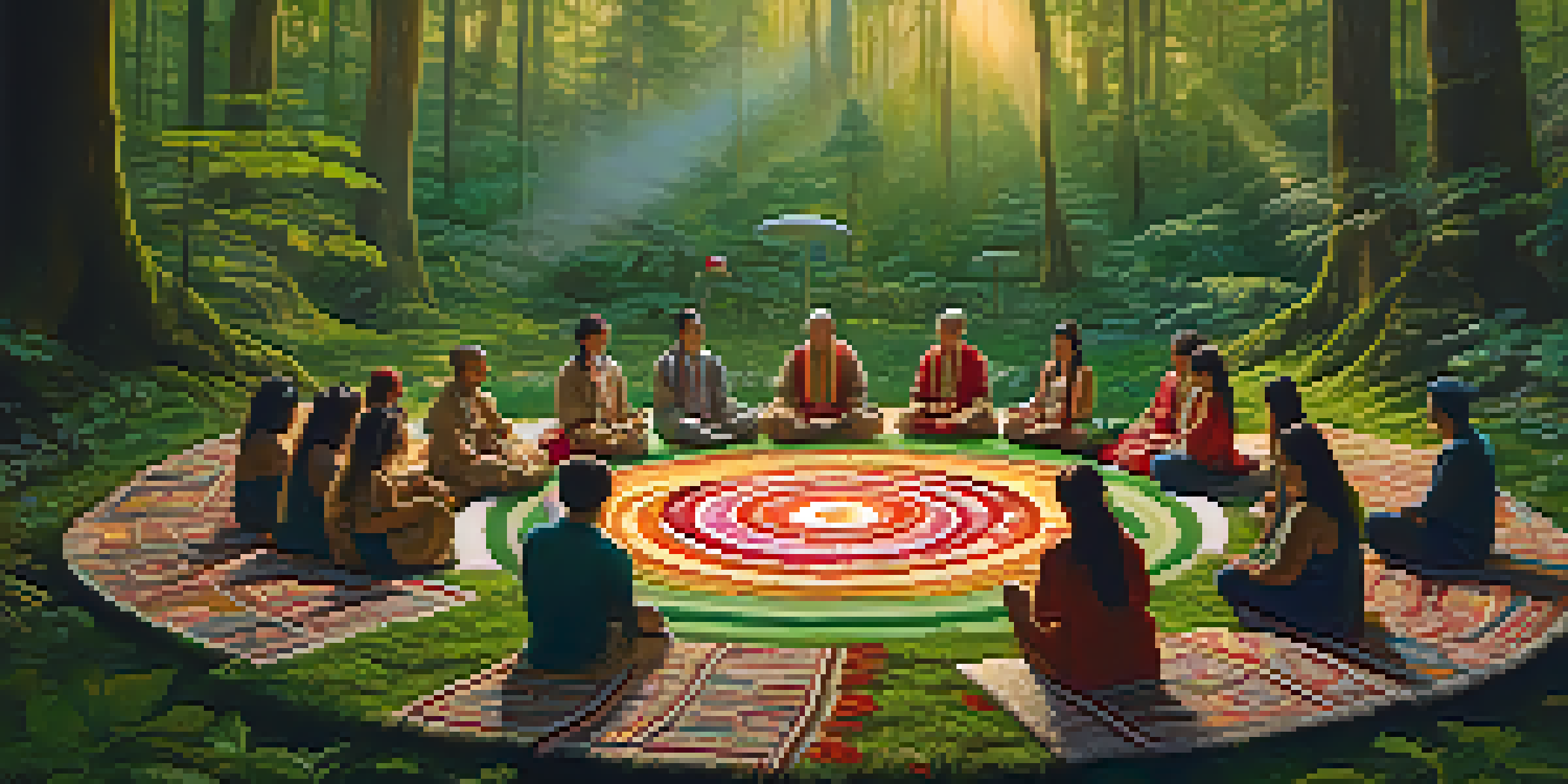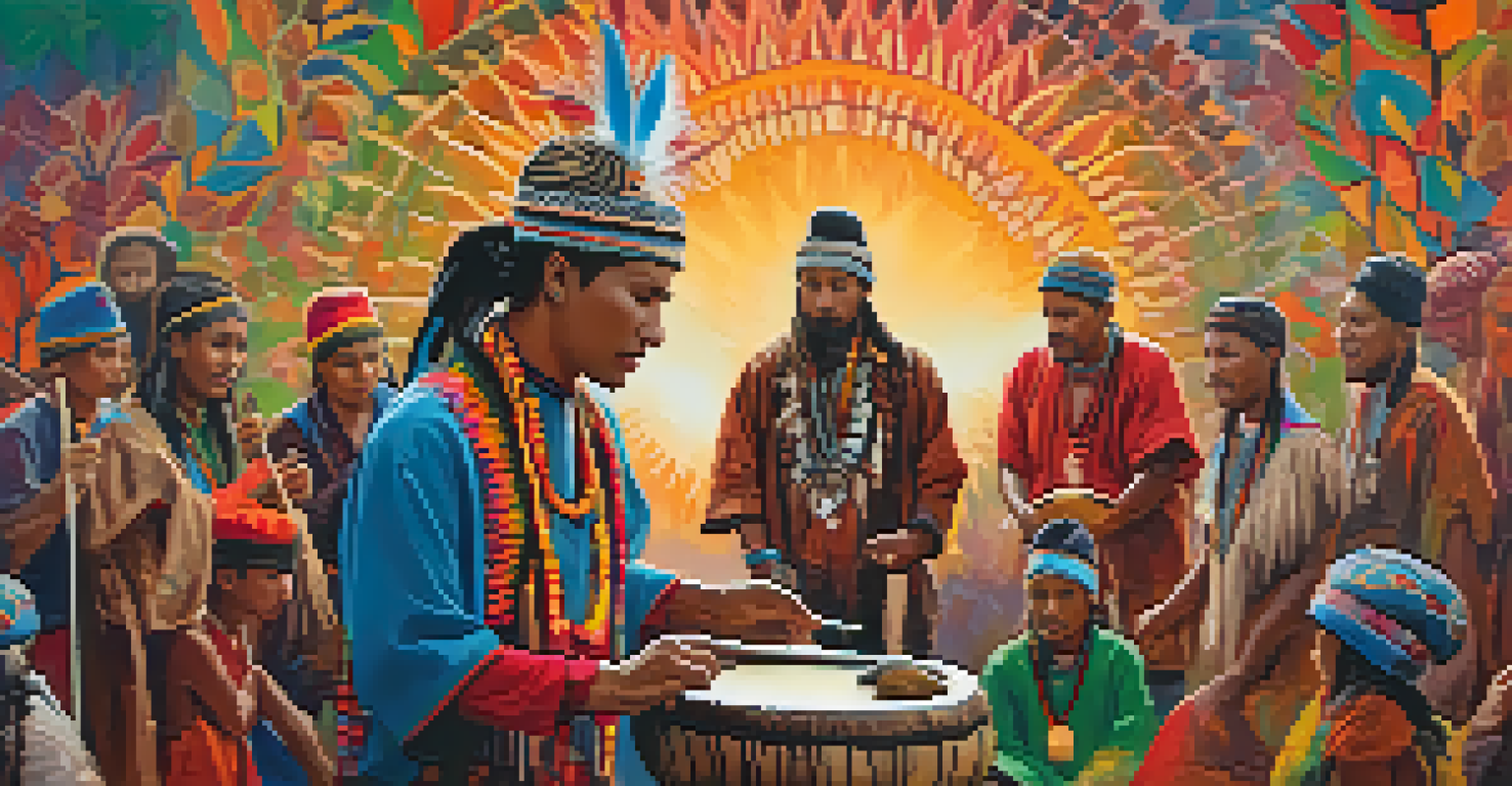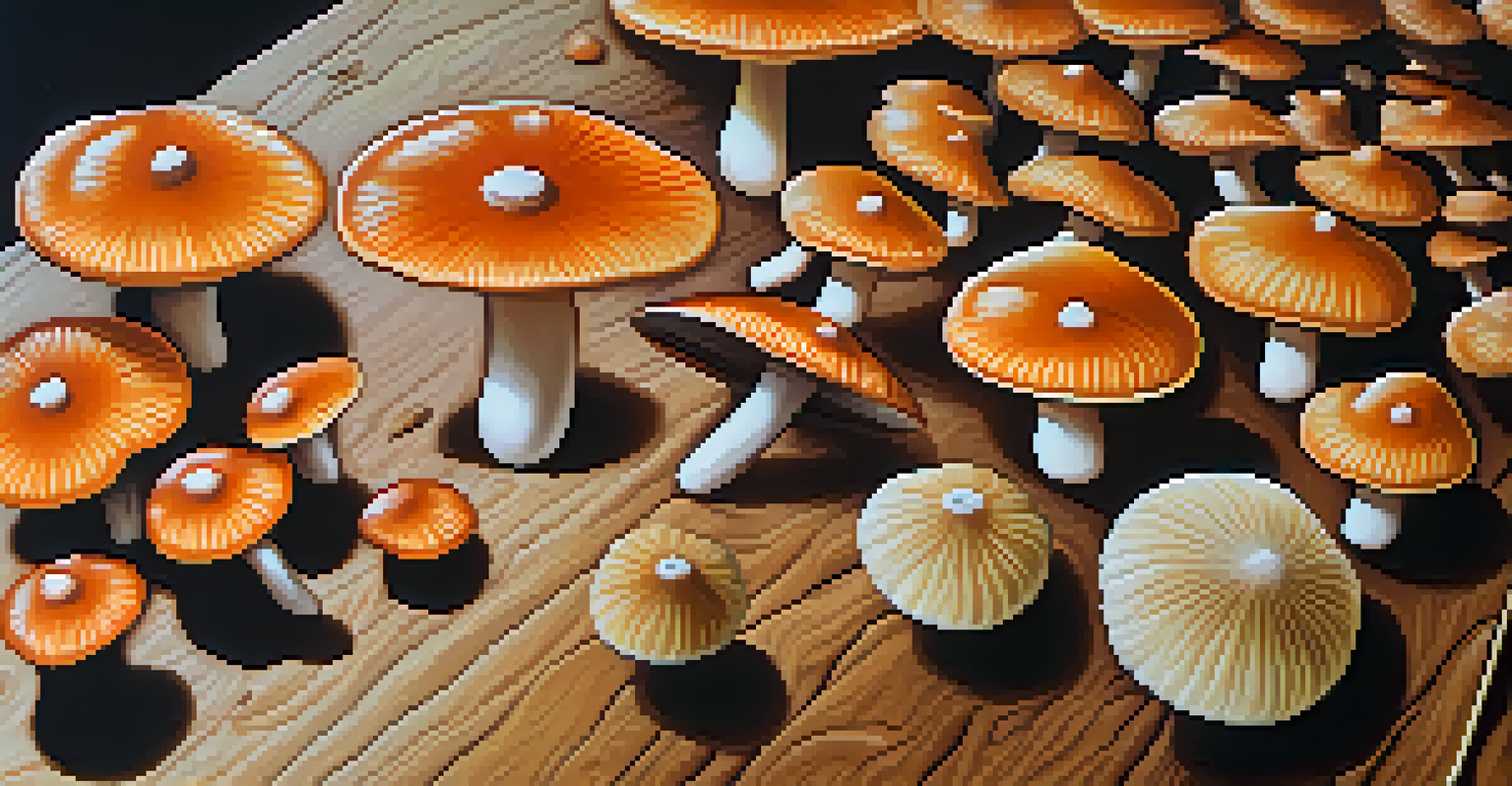Mushroom Ceremonies: A Global Perspective on Entheogens

What Are Entheogens and Their Role in Spirituality?
Entheogens are substances that inspire a sense of spiritual connection, often used in various cultural and religious ceremonies. These natural compounds, like psilocybin found in certain mushrooms, have been utilized for centuries to facilitate profound experiences and insights. By invoking altered states of consciousness, participants often report increased feelings of unity and understanding.
The mushroom is a guide, a teacher, a helper, and a friend, but it is also a mirror reflecting our own consciousness back to us.
Many cultures believe that entheogens can bridge the gap between the material and spiritual worlds. For instance, indigenous communities in the Americas have long used these substances in rituals to communicate with the divine or ancestral spirits. This practice underscores the deep-rooted connection between nature and spirituality that many societies cherish.
As interest in mental health and holistic healing grows, the use of entheogens is being revisited and respected in modern contexts. Scientific studies are exploring their therapeutic benefits, further enhancing their significance in both ancient and contemporary spiritual practices.
Historical Roots of Mushroom Ceremonies Worldwide
Mushroom ceremonies have ancient roots, dating back thousands of years across various cultures. For example, the Mazatec people of Mexico have long practiced mushroom rituals, believing they can facilitate communication with the spirit world. These ceremonies often involve singing, chanting, and guided meditation, creating a sacred space for healing and discovery.

In other regions, such as the Amazon rainforest, indigenous tribes utilize psychoactive mushrooms alongside other plants in their spiritual practices. These ceremonies are often deeply communal, emphasizing the collective experience of participants and the importance of community in healing. This highlights how mushroom ceremonies are not just individual journeys but also shared experiences that strengthen social bonds.
Entheogens Enhance Spiritual Connection
Entheogens, like psilocybin mushrooms, are used in various cultural rituals to foster a sense of unity and spiritual insight.
As we look at these historical practices, it's fascinating to see how they have evolved and adapted over time. Today, many people are seeking out these traditional ceremonies, blending ancient wisdom with modern understanding to explore their own consciousness.
Cultural Variations in Mushroom Ceremony Practices
Different cultures have unique approaches to mushroom ceremonies, each with its own rituals and beliefs. For instance, in the Amazon, the Shipibo people often combine mushrooms with other plant medicines, creating a powerful brew that enhances spiritual experiences. Their ceremonies are rich with music, art, and intricate patterns that reflect their worldview.
Psychedelics can offer a transformative experience that allows individuals to see beyond the confines of their own ego and connect with a deeper sense of reality.
In contrast, the Mazatec rituals focus on the mushrooms themselves, where participants enter a meditative state, often guided by a shaman. The shaman acts as a mediator, helping to direct the energy and intentions of the group. This variation illustrates how each culture adapts its practices to fit its specific spiritual needs and environmental context.
These differences enrich the global perspective on mushroom ceremonies, showcasing the diversity of human experience. As people from various backgrounds engage in these practices, they often blend elements from different cultures, creating new, hybrid ceremonies that honor both tradition and innovation.
Modern Resurgence of Mushroom Ceremonies
In recent years, there has been a resurgence of interest in mushroom ceremonies, particularly in Western societies. This revival is driven by a growing recognition of the mental health benefits these experiences can offer. Many people are turning to these ancient practices as a means of healing trauma, anxiety, and depression, often in a structured ceremonial setting.
Organizations and facilitators are emerging to provide safe spaces for these ceremonies, often incorporating aspects of traditional practices. This blend of ancient wisdom and modern therapeutic techniques allows participants to explore their inner landscapes in a supportive environment. Such settings often emphasize preparation, integration, and community support, which are crucial for a meaningful experience.
Cultural Diversity in Mushroom Use
Different cultures have unique mushroom ceremony practices that reflect their specific spiritual beliefs and communal values.
This modern resurgence highlights a broader cultural shift toward valuing holistic approaches to well-being. As more people share their positive experiences, the stigma around entheogens continues to diminish, paving the way for a deeper understanding of their potential benefits.
The Role of Shamans and Guides in Ceremonies
In many mushroom ceremonies, the presence of a shaman or guide is essential. These trained individuals often have a deep understanding of the spiritual and psychological landscapes that participants may encounter. They serve as navigators, helping to steer the experience and ensure that it remains safe and meaningful.
Shamans often draw upon their extensive knowledge of traditional practices, rituals, and songs to create a supportive environment. Their role goes beyond simply administering the mushrooms; they facilitate the ceremony, guiding participants through their journeys with compassion and wisdom. This can be especially important during challenging moments when participants may feel overwhelmed.
As interest in these ceremonies grows, the importance of finding qualified and experienced guides cannot be overstated. Participants are encouraged to seek out those who respect traditional practices while also being attuned to the needs of modern seekers, ensuring a respectful and transformative experience.
Potential Benefits of Participating in Mushroom Ceremonies
Participating in mushroom ceremonies can offer a range of potential benefits, both spiritual and psychological. Many individuals report profound personal insights during these experiences, leading to a greater sense of purpose and connection to their inner selves. This deep introspection can foster healing and growth, particularly for those grappling with emotional pain or existential questions.
Additionally, participants often experience a sense of unity with others and nature, enhancing feelings of empathy and compassion. This interconnectedness can lead to improved relationships and a broader perspective on life. Many also find that these experiences encourage creativity and emotional release, which can be transformative.
Modern Interest in Healing Ceremonies
A resurgence in mushroom ceremonies is occurring in Western societies, driven by their potential mental health benefits and holistic healing approaches.
However, it's essential to approach these ceremonies with respect and caution. While the benefits can be significant, experiences can also be intense and challenging. Ensuring a supportive environment and proper guidance is crucial for maximizing the positive aspects of the journey.
Legal and Ethical Considerations Surrounding Mushroom Ceremonies
As interest in mushroom ceremonies grows, so do the legal and ethical conversations surrounding them. In many countries, psilocybin mushrooms remain illegal, which complicates access to these experiences. However, recent changes in legislation, particularly in places like Oregon and Canada, show a potential shift toward more acceptance and regulation of these practices.
Ethical considerations are also vital, particularly regarding cultural appropriation. As Western seekers engage with these indigenous practices, it's essential to honor the traditions and communities from which they originate. This includes recognizing the historical context and ensuring that the benefits are shared with the original stewards of this knowledge.

Navigating these legal and ethical landscapes is crucial for anyone interested in participating in mushroom ceremonies. By staying informed and respectful, individuals can contribute to a supportive environment that honors both the cultural origins of these practices and the well-being of participants.